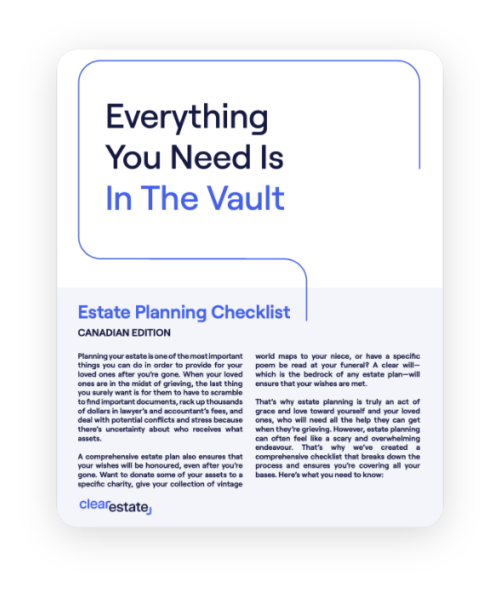Estate Planning
Oct 27, 2025
Introducing Empathy to Estate Bureaucracy
ClearEstate’s origin story: how grief, inefficiency, and compassion inspired Alex to build a fintech that brings empathy and efficiency to estate planning and settlement
It begins with a conversation — the paperwork can wait


At the end of the traditional holiday season, many of us are especially attuned to the wellbeing of those closest to us. This more subdued time of year presents a unique opportunity to catch up, and have some heart-to-heart conversations about preparing for the future.
Wills and estate planning may not be the first thing associated with the promise of a new year but, when you think about it, the post-holiday period is a fine time to introduce the conversation, without necessarily diving right into the paperwork. The idea is not to convey panic about the future but to show your loved ones that you are concerned with their peace of mind.
Sara Hillier, Director of Estate Solutions & Partnerships for ClearEstate, is reminded of a saying in the industry that she and her team put into action every day: “Estate planning is an act of empathy.”
Having a plan not only shows you care for your loved ones but it could even be described as an act of radical empathy, taking your commitment to the next level by making sure chosen executors are spared months, perhaps years of paperwork.
How to communicate that this delicate process is in everyone’s best interests is the tricky part.
No one wants to take away from quality time with the family by making things uncomfortable. There is a right way and a wrong way to broach discussions surrounding end-of-life planning, and it helps to remember that everyone is feeling the weight of what’s at stake.
People often tell Hillier that their family has already had the discussion, but it’s not enough to simply skim the surface.
“The quality of that conversation, or the length and depth of that conversation, tends to be limited,” Hillier explained. “People just want to rush through and get it over with. Looking at it as an act of radical empathy gives you the space to be honest about what needs to be done.”
Far too often, people mistakenly assume their situation is simple and doesn’t require planning. Yet it’s the absence of planning that makes things complicated for family members.
“People often don’t realize that if something happens to them, not only will their family be grieving — they'll also face numerous obstacles and challenges because estate settlement is such a complicated process,” continued Hillier.
Of course, every family is unique as is the conversation. There is no perfect roadmap for all families, though it helps to remember that you’re dealing with different personalities and generations, all with their own perceptions of and feelings toward mortality. If there is one constant, it’s that a soft touch and an abundance of empathy can go a long way.
“I think a soft approach is always the right way to go,” advised Hillier. You may try highlighting a few things that could present a challenge, like: Mom, what if you didn't feel well enough to take care of yourself? Where might you want to live? What would be important to you in that circumstance? If it’s a values-based discussion, hopefully you can highlight what needs to be done in terms of a plan.”
A plan on its own is not enough.
In her position as a frontline client contact, Hillier knows firsthand the consequences of putting off talk of planning until it is too late. Without productive conversation, you risk family members not accepting plans, or worse, provoking suspicion if someone is avoiding the issue.
“Talking about it in advance actually does a few things,” explained Hillier. “It gives everyone an opportunity to ask questions and maybe bring up things that you didn't know were important to them, like jewellery or cherished heirlooms. For things like that, it’s a great opportunity to learn.”
And that’s exactly where she’s seen it all go wrong when plans are not in place; when discussions begin about assets.
Hillier describes this common nightmare scenario: “Nothing is laid out. And then everyone is fighting because they all have different viewpoints, different perspectives, their own interests, and they're also grieving. The number-one thing that people fight over is personal effects, which often are not included in planning discussions. And while they may not hold significant monetary value, the sentimental value is immeasurable. The latter is arguably more important, and that is where we run into problems.”
Estate planning is recommended but it’s the settlement stage that’s most overwhelming, both emotionally for the executor and financially for the estate.
An average North American estate will take about a year and a half to settle, and cost upwards of $10,000.
In choosing ClearEstate, executors get access to a simple-to-use platform with live support by compassionate, experienced advisors like Hillier who can be reached directly within the platform. Clients will also have the entire step-by-step process organized and customized with links to bank accounts and other assets — enabling appropriate and convenient transparency for all executors and beneficiaries.
“I would say that the number-one thing we do,” she explained, “is walking executors through the big decisions. We work with you to demystify this role that has been thrust upon you. We're real people and will help you understand what needs to be done in real terms.”
Checklists, step-by-step instructions and hands-on support help to simplify the process while laying the groundwork for a deeper understanding and awareness of everything that matters in successfully settling an estate. When broaching this conversation with your family, Hillier recommends the “Turkey Test” as a barometer for measuring receptiveness and emotional consensus.
“It sounds kind of funny, but it’s a fairly accurate gauge of where your loved ones are at when it comes to end-of-life planning discussions. Ask yourself: once the estate is settled, will you and your loved ones still be able to gather around the table for a holiday meal, free from strain? Can you be together and not think or worry about what happened? Or what's happening? If you are not increasing your collective peace-of-mind, something’s not working and we can help with that, too!”
If you have any questions about planning your estate, get in touch with ClearEstate to book your free consultation.
 Secure Your Legacy
Secure Your Legacy
Get your free 12-step Estate Planning checklist now. 89% of readers complete their estate plan within 3 months of using our guide.
Instantly Access Now